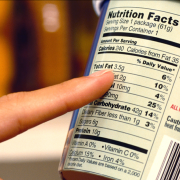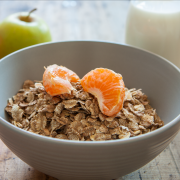
"Obesity runs in my family": a phrase commonly uttered by people that find it difficult to manage their weight. But can we use our genes as an excuse in the weight loss war? Scientists are starting to understand how genes not only influence our eye colour, body shape and height, but also how our genetic variability may affect our ability to maintain a healthy weight.
The Language of DNA
DNA is the genetic material that our body is made. We get half of our DNA from our mothers and the other half from our fathers. Our DNA includes all the instructions needed for the body cells to function optimally. Genes are made up of long stretches of DNA. Simply put, DNA is like the alphabet and genes are the words that the DNA alphabet spells out. All our genes together are known as our genome, which is the body’s complete list of instructions.
What does it mean when I have a genetic variation?
In 2003, the revolutionary Human Genome Project mapped every single gene in the human body. There are around 22 300 genes, and while 99% are the same, there are times when there are small variations in our genes, such as variations in hair and eye colour. Because of these variations we all have a unique genetic make-up, making us both genetically and visibly different.
Sometimes there may be genetic variations that may make us vulnerable. This vulnerability is even further enhanced in the context of poor environmental and lifestyle factors such as being overweight/obese, smoking, inactivity, a low fruit and vegetable intake, a high saturated fat intake, among others. These factors, in conjunction with our genes, may impact our weight.
Should you test your genes?
There are several commercially available tests in South Africa to test your genes. Genetic tests can help us determine our obesity risk, how the body responds to carbohydrates and different types of fats (such as saturated, monounsaturated and polyunsaturated fats), our response to physical activity, and even factors such as snacking behaviour and feelings of fullness. When you test your genes, this allows you to pinpoint and address the environmental and lifestyle factors. When we understand our unique genetic variations, we can piece together the complex puzzle of our health, personalising our dietary approach. This helps us to eliminate much of the guess work and direct our focus towards the right eating plan. This might be why a low carbohydrate/high fat diet helped a friend lose drastic weight but did nothing for you when you tried this approach.
Can I blame my parents for my weight?
It’s a scary statistic that two in three women in South Africa are overweight/obese and just under one third of men are overweight/obese. Being overweight is concerning as it increases a person’s risk for other chronic disease such as cancer, heart disease and type 2 diabetes, and can lead to a poorer quality of life overall. There is some evidence that obesity has a genetic basis. The risk of a child being obese is 10 times higher if both the parents are obese and up to 4 times higher if either parent is obese.
- Variations in a gene called FTO has been associated with obesity. FTO also increases risk of type 2 diabetes and heart disease through the gene’s effect on increasing body fat. People with a certain variation may have a greater risk for obesity when inactive and eating a lot of saturated fat (e.g. fatty cuts of meat, chicken skin, coconut oil). In addition, this gene is strongly linked with regulating the appetite and a decreased feeling of fullness after meals.
- People with a genetic variation of ADRB2 find it more challenging to lose weight because of a higher tendency to store dietary fat as body fat. ADRB2 may affect our sensitivity to carbohydrates, potentially guiding us to focus on our quantities of carbohydrates in the diet.
- FABP2 encodes a protein found in the small intestine which influences fat absorption and metabolism.
- PPARG has a role to play in how fat cells are made and is highly sensitive to the type and amount of fat in the diet. People with this gene variation have an increased risk for a higher waist circumference.
- A variation in ADRB2 may make the body slow to breakdown fat, which means you may lose weight more slowly. This gene indicates that diet is particularly important for weight management.
- A variation in the APOA5 gene increase risk for gaining weight and less weight loss when following a high fat diet, especially if rich in saturated fats. This would mean monounsaturated fats are very important in their diets.
- A gene called TCF7L2 is linked to fat mass and obesity and variations may put you at a greater risk for obesity when inactive and eating a lot of saturated fats.
Scientists are cautious to not overemphasise that genes are the basis for the rapid rise in prevalence of overweight/obesity. While genes may play a role, it is difficult to know what part of this has a true genetic association and what part is due other factors that cluster in families. Because beyond a direct genetic tendency to be overweight, we may also indirectly learn poor habits from our parents that affect weight, such as eating large portions, being in active, drinking sugary drinks with meals, or finishing off each meal with dessert. For this reason, it is important that we recognise that the causes of obesity are multifactorial and multidimensional. While there might be a genetic link to obesity, this is only a piece of the larger, very complex puzzle in managing weight. Simply knowing your genes is not enough: we still need to take actionable steps to improving your weight and overall health. While genetic tests are not weight loss plans per se, the tests can be used as a tool that a registered dietitian can assist you in implementing the necessary key dietary changes and behaviours in conjunction with your personalised genetic results. These results can help guide us on our journey to long term and successful weight loss.
References
- H TJ, Lin E. The Pro12Ala polymorphism in the peroxisome proliferator-activated receptor gamma (PPARG) gene in relation to obesity and metabolic phenotypes in a Taiwanese population. Endocrine. 2015; 48(3):786–793.
- Liu Y et al. Association of the FABP2 Ala54Thr polymorphism with type 2 diabetes, obesity, and metabolic syndrome: a population-based case-control study and a systematic meta-analysis Genetics and Molecular Research. 2015; 14(1):1155-1168.
- Loos RJF, Yeo GSH. The bigger picture of FTO – the first GWAS-identified obesity gene. Nature reviews Endocrinology. 2014;10(1):51-61. doi:10.1038/nrendo.2013.227.
- Rhada V, Mohan V. Obesity – Are we continuing to play the genetic “blame game”? Advances in Genomics and Genetics. 2016;6:11-23.
- Saliba LF. et al. Obesity-related gene ADRB2, ADRB3 and GHRL polymorphisms and the response to a weight loss diet intervention in adult women. Genet. Mol. Biol., 2014; 37(1): 15-22.
- South Africa Demographic and Health Survey 2016: Key Indicator Report, Statistics South Africa.
- Szendrei B et al. Influence of ADRB2 Gln27Glu and ADRB3 Trp64Arg polymorphisms on body weight and body composition changes after a controlled weight-loss intervention. Applied Physiology, Nutrition, and Metabolism, 2016, 41(3): 307-314.

 No added or artificial sugars
No added or artificial sugars The cleanest ingredient labels
The cleanest ingredient labels






